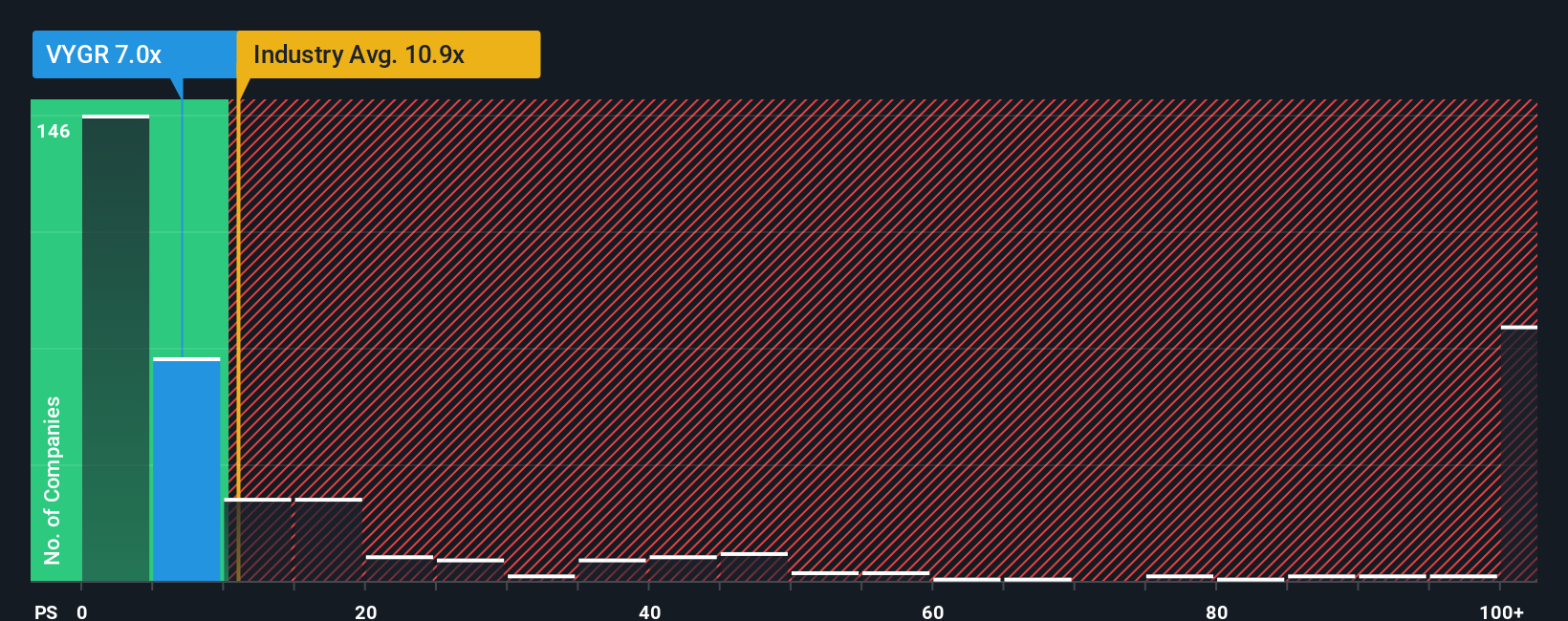- United States
- /
- Biotech
- /
- NasdaqGS:VYGR
Benign Growth For Voyager Therapeutics, Inc. (NASDAQ:VYGR) Underpins Stock's 26% Plummet
Voyager Therapeutics, Inc. (NASDAQ:VYGR) shares have retraced a considerable 26% in the last month, reversing a fair amount of their solid recent performance. Instead of being rewarded, shareholders who have already held through the last twelve months are now sitting on a 30% share price drop.
Since its price has dipped substantially, Voyager Therapeutics may be sending buy signals at present with its price-to-sales (or "P/S") ratio of 7x, considering almost half of all companies in the Biotechs industry in the United States have P/S ratios greater than 10.9x and even P/S higher than 104x aren't out of the ordinary. Nonetheless, we'd need to dig a little deeper to determine if there is a rational basis for the reduced P/S.
Check out our latest analysis for Voyager Therapeutics

What Does Voyager Therapeutics' Recent Performance Look Like?
Voyager Therapeutics hasn't been tracking well recently as its declining revenue compares poorly to other companies, which have seen some growth in their revenues on average. The P/S ratio is probably low because investors think this poor revenue performance isn't going to get any better. If you still like the company, you'd be hoping this isn't the case so that you could potentially pick up some stock while it's out of favour.
Want the full picture on analyst estimates for the company? Then our free report on Voyager Therapeutics will help you uncover what's on the horizon.Is There Any Revenue Growth Forecasted For Voyager Therapeutics?
Voyager Therapeutics' P/S ratio would be typical for a company that's only expected to deliver limited growth, and importantly, perform worse than the industry.
Retrospectively, the last year delivered a frustrating 81% decrease to the company's top line. The last three years don't look nice either as the company has shrunk revenue by 56% in aggregate. Therefore, it's fair to say the revenue growth recently has been undesirable for the company.
Turning to the outlook, the next three years should generate growth of 33% per year as estimated by the twelve analysts watching the company. With the industry predicted to deliver 115% growth per year, the company is positioned for a weaker revenue result.
With this information, we can see why Voyager Therapeutics is trading at a P/S lower than the industry. Apparently many shareholders weren't comfortable holding on while the company is potentially eyeing a less prosperous future.
What We Can Learn From Voyager Therapeutics' P/S?
Voyager Therapeutics' recently weak share price has pulled its P/S back below other Biotechs companies. Generally, our preference is to limit the use of the price-to-sales ratio to establishing what the market thinks about the overall health of a company.
We've established that Voyager Therapeutics maintains its low P/S on the weakness of its forecast growth being lower than the wider industry, as expected. At this stage investors feel the potential for an improvement in revenue isn't great enough to justify a higher P/S ratio. Unless these conditions improve, they will continue to form a barrier for the share price around these levels.
You need to take note of risks, for example - Voyager Therapeutics has 3 warning signs (and 1 which makes us a bit uncomfortable) we think you should know about.
If strong companies turning a profit tickle your fancy, then you'll want to check out this free list of interesting companies that trade on a low P/E (but have proven they can grow earnings).
New: Manage All Your Stock Portfolios in One Place
We've created the ultimate portfolio companion for stock investors, and it's free.
• Connect an unlimited number of Portfolios and see your total in one currency
• Be alerted to new Warning Signs or Risks via email or mobile
• Track the Fair Value of your stocks
Have feedback on this article? Concerned about the content? Get in touch with us directly. Alternatively, email editorial-team (at) simplywallst.com.
This article by Simply Wall St is general in nature. We provide commentary based on historical data and analyst forecasts only using an unbiased methodology and our articles are not intended to be financial advice. It does not constitute a recommendation to buy or sell any stock, and does not take account of your objectives, or your financial situation. We aim to bring you long-term focused analysis driven by fundamental data. Note that our analysis may not factor in the latest price-sensitive company announcements or qualitative material. Simply Wall St has no position in any stocks mentioned.
About NasdaqGS:VYGR
Voyager Therapeutics
A biotechnology company, focuses on the human genetics for the cure of neurological diseases.
Flawless balance sheet with low risk.
Similar Companies
Market Insights
Community Narratives




